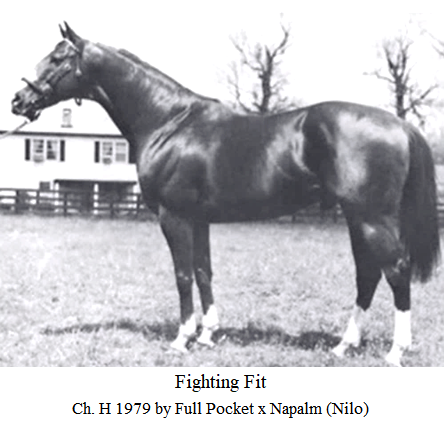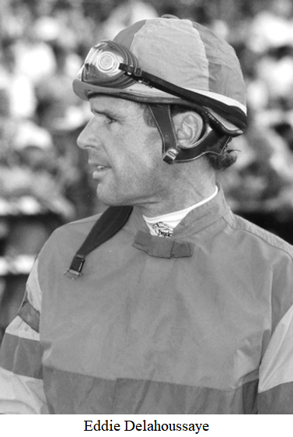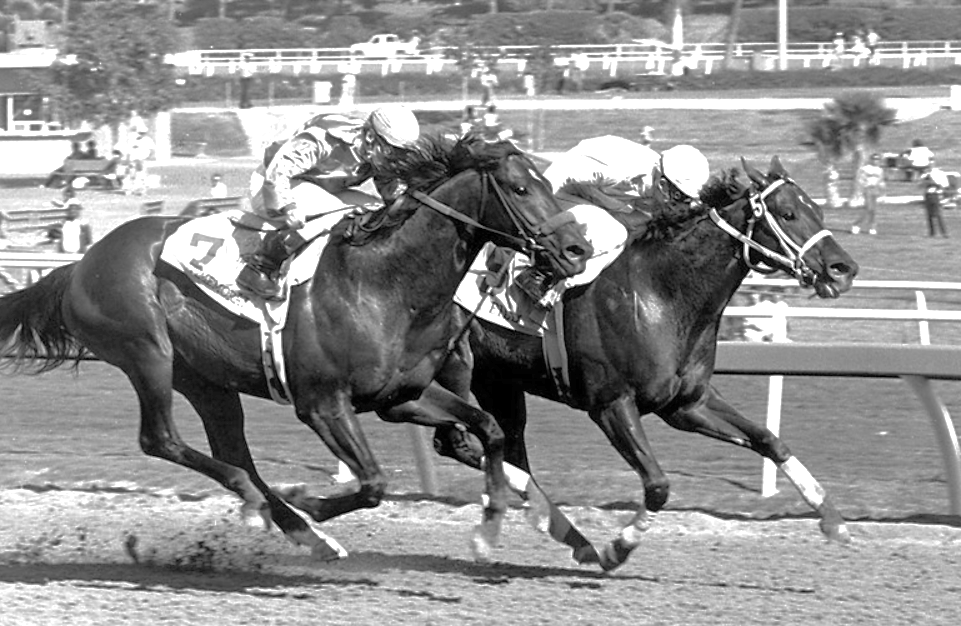
Eillo hung on to defeat Commemorate by a desperate nose in the Breeders' Cup Sprint (PHOTO: Breeders' Cup)
By: Walter Lazary /// 2,819 Words /// Includes: Charts, Slides, Video.
1984 Breeders' Cup Sprint
Three-Year-Olds and Up - Six Furlongs
The Breeders’ Cup Sprint was one of those races where, for various reasons, several of the nation’s best sprinters didn’t show up, but in the end, most people would agree that possibly the most talented one did.
One of the major sprinters missing that year was Debonaire Junior, a speedy son of Debonair Roger, who eventually sired Melair. The three-year-old gelding, who was bred and owned by Jack Rogers, won seven or his fourteen starts in 1984, his first year of racing, including four stakes: the Baldwin, Debonair, Triple Bend Handicap, and the Palos Verdes Handicap.
Another that wouldn’t run in the Sprint was the speedy Fortunate Prospect, who defeated the talented Precisionist in the seven-furlong G3 San Vincent Stakes back in February at Santa Anita. The three-year-old son of Northern Prospect, who won the Criterium Stakes at Calder and the Morvern Stakes at The Meadowlands in 1983, and earlier in 1984 won the G3 San Vincente at Santa Anita and the Select Handicap at Monmouth, was no match for Debonaire Junior in two previous meetings, one of which was the Debonair Stakes at Hollywood Park which Debonaire Junior won by seven lengths in 1:08 4/5, with Commemorate well back in the beaten field, finishing fifth.
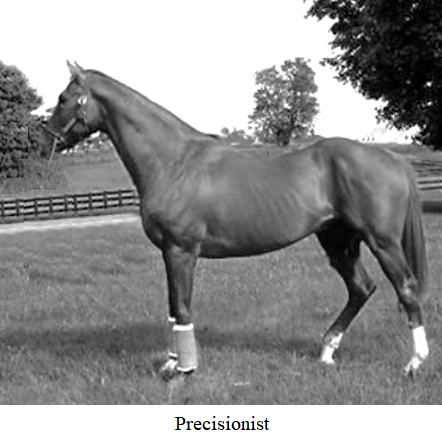
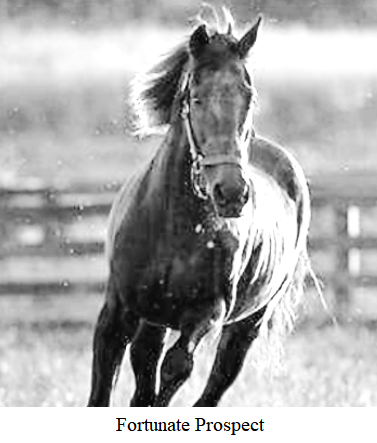
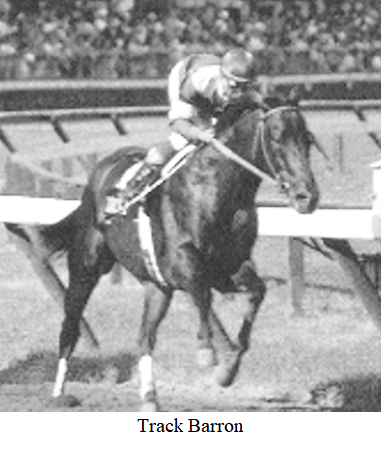
There were other good sprinters, among them Track Barron, the G1 Vosburgh Handicap winner, who was scheduled to go in the Sprint, but then on Breeders’ Cup morning, was declared out of the Sprint and entered in the Classic (he was cross-entered in both) because his owner felt confident that the three-year-old son of Buckfinder could handle the ten-furlong Classic distance after winning the nine-furlong G1 Dwyer Stakes by 13 ½-lengths.
Precisionist, a speedy son of Crozier, and a colt that would win the 1985 Breeders’ Cup Sprint while on his way to being inducted into the National Museum of Racing and Hall of Fame, had won the six-furlong San Miguel Stakes earlier that year over Fortunate Prospect and Commemorate, but his connections would also opt to go in the Classic.
Another that might have made his presence felt was Night Mover, a four-year-old son of Cutlass who was owned by Ann and Jerry Moss, who owned the great Zenyatta. Night Mover won three sprint stakes in 1984, the El Conejo Handicap at Santa Anita over Dave’s Friend, the Bing Crosby Handicap at Del Mar over Premiership and Pac Mania, and in between those stakes, the G3 Los Angeles Handicap at Hollywood Park when he came on late to nail Debonaire Junior just before the wire. The colt would run on Breeders’ Cup day, but his connections opted to go in the one-mile Turf instead of the Sprint.
It would have been a treat to have those five run in the Sprint, along with Europe’s best sprinter, Committed; and yet, though the watered-down field in the Sprint was not loaded with talent, especially for a $1 million race, it still had arguably the best sprinter in America who would line up with ten others, including three fillies.
As expected, the race favorite was Crown Stable’s Florida-bred four-year-old colt, Eillo, who was by double Chefs-de-Race Mr. Prospector and out of the Northern Dancer mare, Barb’s Dancer. Eillo, which is owner Ollie Cohen’s first name spelled backward, had won seven of his nine starts in 1984. The year before, the colt began his career with a flourish, winning his first four starts, an MSW, and three allowance races. He then made his stakes debut in the Fall Highweight at Belmont Park. Carrying 130 pounds and jockey Jorge Vasquez, he suffered his first defeat after making a good move early before fading late and fishing second.
Eillo ended 1983 on a three-race losing streak, but won his first start at four, a Hialeah track record performance when he won the six-furlong Tallahassee Handicap on January 9 over stakes winner Center Cut in 1:08 1/5. It was an amazing effort in which his final quarter mile was timed in 23 4/5 seconds, and his final time shaved three-fifths of a second off the old mark. That race seemed to set the tone for what was to come. Eillo was back out on the 28th in the six-furlong Kendall Stakes, which he won by a widening seven lengths in 1:09 4/5. With trainer Bud Lepman looking to see if he could get the speedy colt to go another furlong, Eillo next ran in a seven-furlong allowance at Hialeah on February 10th and wowed the crowd, drawing off to win by three lengths in 1:21 1/5, with his first six-furlongs timed in 1:09. That set him up for the seven-furlong Hialeah Sprint Championship, which he won by six-lengths in 1:21 4/5, with his first six-furlongs time of 1:09 1/5.
Leaving Hialeah having won all four of his starts, Lepman entered Eillo in a one-mile turf race at Gulfstream Park on March 31. When the race was over, the wily trainer got the message – the lightning-fast colt was definitely a sprinter, and the turf wasn’t for him. Off nicely, Eillo was in front and unpressured for the first quarter mile, but after that, he shortened stride and faded all the way back to finish eleventh, beaten by thirty-one lengths. However, when he returned to be unsaddled, Lepman discovered a gash on his left hind hock, which happened when he kicked himself. Switched back to dirt, Eillo fared no better in his next start, the six-furlong G3 Count Fleet Stakes at Oaklawn Park on April 19th. Sent off as the even-money favorite, the speedy colt blitzed the opening quarter in 21 2/5 seconds and continued to lead the field to the half in 44 1/5. At this point, he looked like he would win as he pleased, but then he began to back off and faded all the way back to finish seventh, nine lengths behind old-timer Dave’s Friend, who got the distance in 1:09. Much like there had been an excuse for his poor performance in his turf race, there was one in the Count Fleet as well. This time he suffered a badly bruised left frog, which eventually had to be cut out. This caused him to miss three months while a new one grew back.
There was one thing about Eillo that not too many people were aware of, and that was that he had issues and was constantly bothered by infirmities, especially in his lower legs. “He walks like Charlie Chapman with his toes turned out,” Bud Lepman once said. “He’s badly pigeon-toed. His bad legs were the reason he never raced at two.” That year, Lepman had him close to starting at Monmouth Park in an MSW on June 2, 1982. In fact, well-known jockey Buck Thornburg took him out for a four-furlong work, which the young colt blitzed in forty-five and change from the gate, and he did it easily. Thorton was impressed and said that Eillo was the fastest two-year-old he had ever ridden. Soon after, however, the colt’s bad legs got the best of him, and he was put away for the balance of the year.
During his career, Eillo often raced with bandages on all four legs, and after his loss in the Count Fleet, Lepman had to take his time with him. The hard-luck colt was laid up for three months before he returned on July 21 at Monmouth Park, when he won a six-furlong allowance race in the slop in 1:09 3/5.
Just when it looked like Eillo was finally back to normal, he suffered yet another setback, this time when he became violently ill. “We almost lost him,” Lepman said. “He had a high white blood count due to a bronchial infection, and it was a good 48 hours before we knew if he would pull through or not. Antibiotics arrested the infection and it took a few weeks for him to get back to normal.”
Despite his many setbacks, Lepman said that the time off was actually a good thing because it helped reduce the wear and tear on Eillo’s tender legs. When he did return on September 11 in a six-furlong allowance sprint at Philadelphia’s Keystone Park, it was as if he had never been away as he cruised to a nine-length victory with regular jockey Craig Perret on board. Lepman was elated, especially with the time, which was 1:08 4/5, just three ticks off the track record, while running his final quarter in 24 1/5 seconds. What impressed Lepman was seeing Perret gearing him down as he crossed the line. “He’s back where we want him to be as we point him to the Breeders’ Cup Sprint,” Lepman said. “And if he should win it, he might get an Eclipse Award. That would be something for a horse that has been bothered as much as he has by infirmities. But you always get ulcers from good horses, and he is definitely a good horse and top-notch sprinter.”
Eillo’s final tune-up for the Breeders’ Cup was the six-furlong Chief Pennekeck Handicap at the Meadowlands on October 6. Carrying high weight, 124 pounds, the eager colt made every post a winning one as he drew off to win by an easy five lengths in 1:09 4/5. That race, followed by a fast workout on November 6 – four furlongs in 45 seconds handily from the gate, suggested that Eillo was as ready as he would ever be, especially after he zipped through the first three furlongs in 33 1/5 seconds, then finished the work when he galloped out five furlongs in 57 seconds flat.
The six-furlong Sprint would see eleven go postward, three of which were fillies: the Irish-bred and British-raced three-year-old Princess Tracy, the New Zealand-bred four-year-old Tangent, and Pleasure Cay, a four-year-old daughter of Foolish Pleasure. Of the three, only Pleasure Cay was bet with serious money as she would eventually go off as the 4-1 third choice, down from her 10-1 odds in the morning line. The filly already had a good year, winning four stakes: the G3 Barbara Fritchie, the G3 Bed o’ Roses, the listed Rancho Bernardo Handicap, and the Dancing Femme Handicap. In the Rancho Bernardo, she showed that she could run when she flew from off the pace to get past five-time stakes winner Lovlier Linda, in 1:08 3/5, this after running her final quarter in 23 4/5 seconds.
There were two other colts that were a threat. Fighting Fit, at 7-2 in the morning line, was a five-year-old son of Full Pocket. Owned by Mr. and Mrs. Jerry Moss and trained by Bobby Frankel, Fighting Fit was a four-time stakes winner in 1983 but had just a single allowance win to his credit in seven starts in ’84. Like Eillo, he was also having his issues, in his case, with small broken bones in his feet. To try and overcome this, Frankel had fitted him with bar shoes, and on November 6th, jockey Eddie Delahoussaye worked him a swift five-furlongs in 58 3/5, the fastest time that morning at the distance. If there was one thing in Fighting Fit’s favor it was that he loved Hollywood Park and had won seven times there.
Windfields Farm’s Commemorate, at 4-1, the third-morning line favorite, was purchased earlier in the year from Louis Wolfson, the owner of Harbor View Farm, whose Outstandingly was moved up to win the Juvenile Fillies in the previous race. Despite his losses to Debonaire Junior and Precisionist, when Commemorate was right, he could be awfully tough, which Gate Dancer, who was going in the Classic, found out the year before when the son of Exclusive Native defeated him in the six-furlong Los Felez Stakes. Commemorate had been busy in 1984, winning five of his seventeen starts, including the Los Angeles Express Handicap at Hollywood Park, a five-furlong dash in a rapid 57 2/5 seconds, and the King’s Bishop at Saratoga in which he went seven-furlongs in 1:22 3/5. Laz Barrera, who trained the colt for Harbor View Farm, continued to train him for Windfields Farm.
The Irish-bred and British-raced three-year-old Princess Tracy was far from being considered the best sprinter in England, an honor which went to American-bred but British-raced Committed. She did win three stakes, however, the six-furlong BBA Stakes at Phoenix on May 2 in 1:09 4/5, five-furlong group three Ballyogan at Leopardstown by a head in 58 3/5 on June 4, and the six-furlong G3 Phoenix Sprint Championship at Phoenix in 1:07 2/5 on July 28 (it might have been an about distance). After a ten-week layoff, she tackled group one company in the six-furlong Prix de L’Abye at Longchamp on October 7 but was no match for Committed as she finished twelfth.
The New Zealand-bred four-year-old filly, Tangent, was another question mark. Good on turf, she also loved the dirt and, by all accounts, was a pure sprinter. By Last Tango, an Irish bred that won the minor six-furlong Ayr Gold Cup at Doncaster in England, Tangent made her first nine starts in New Zealand and won five of them. She came to the United States at the beginning of the year, and after a second-place finish in an allowance at Santa Anita, she then reeled off five straight wins, three of them in stakes, and set a six-furlong track record at Louisiana Downs when she won the Suthern-Stakes in 1:08 2/5. Owned by Jerry McGee and trained by Wayne Murty, she would be ridden by Gustav Barrera.
The balance of the field was in tough. Charging Falls, a three-year-old colt by Taylors Falls, was a minor stakes winner of the Sophomore Handicap at Albuquerque but finished second to Debonaire Junior in front of Premiership, Commemorate’s full brother, in the Palos Verdes Handicap.
Pac Mania, a son of Ramsinga out of the Boldnesian mare Bold Captive, was a half-brother to Skywalker, a two-year-old that didn’t run in the Juvenile but would win the Breeders’ Cup Classic in 1986. Pac Mania started the year off with a bang, winning the G2, seven-furlong Malibu Stakes over Retsina Runa and Desert Wine, then finished second in the G2 San Carlos to Danebo. However, in his next seven starts, Pac Mania could only manage a third-place finish to Night Mover and Premiership in the Bing Crosby Handicap and was coming into the Sprint off a fourth-place finish to Tsunami Slew, Night Mover, and Debonaire Junior in the Morvich Handicap on the turf. The colt was one of two that trainer Charlie Whittingham had in the Sprint, the other being the Irish colt Aras An Uachtarain, who had made two starts in North America, both allowance races on the turf. Racing in England, he had won just two races and had been manhandled by Committed three straight times.
Two others seemed to have even less of a chance. Reesh, an English-bred, had finished fifth in the group one Sprint Championship at York to Committed. Earlier that summer, the colt had won five straight races, including three consecutive group threes, but had never raced on the dirt. Explosive Wagon, a four-year-old son of Explodent, had won 17 of 31 lifetime starts, including two stakes, the Louisiana Handicap and the Sport City Handicap, but he was a router, not a sprinter, and was coming into the race off a sixth place finish in the Louisiana Downs Handicap which was at 11-furlongs on the turf.
Breeders’ Cup Sprint
The Sprint was exciting, especially the finish. Eillo, as he always does, rocketed away from the gate and, for the twelfth straight race, was on top after the opening quarter, this time leading Pleasure Cay past that station in 22 2/5 seconds with Princess Tracy third and Commemorate fourth. Craig Perret slowed the pace slightly as Eillo continued to lead unopposed and took them through a 23 1/5 second quarter as he sped to the half-mile pole in 45 3/5. Turning into the stretch, Eillo was on top by two lengths and added another half-length to that as he passed by the eighth pole. That was when Commemorate entered the picture. With Chris McCarron pumping hard and going to the whip, the Windfields colt made it a race as it closed quickly to just miss catching the leader by a nose, with Fighting Fit, last for much of the race, closing fastest of all to finish third, a length and one-half further back. The final time was 1:10 1/5 with internal fractions of 22 2/5; 45 3/5; and 57 1/5.
The Breeders’ Cup Sprint would be Eillo’s last race. Four weeks after his greatest triumph, he suffered through a bout of colic, which was so severe it required surgery. Sadly, the surgeons were unable to save his life, and Eillo had to be put down. He was honored posthumously when he received the Eclipse Award for being the nation’s top sprinter.
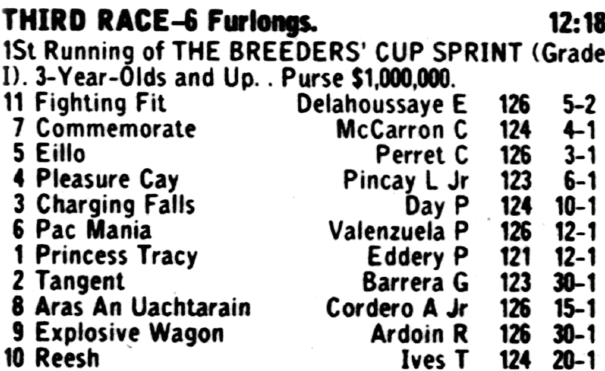
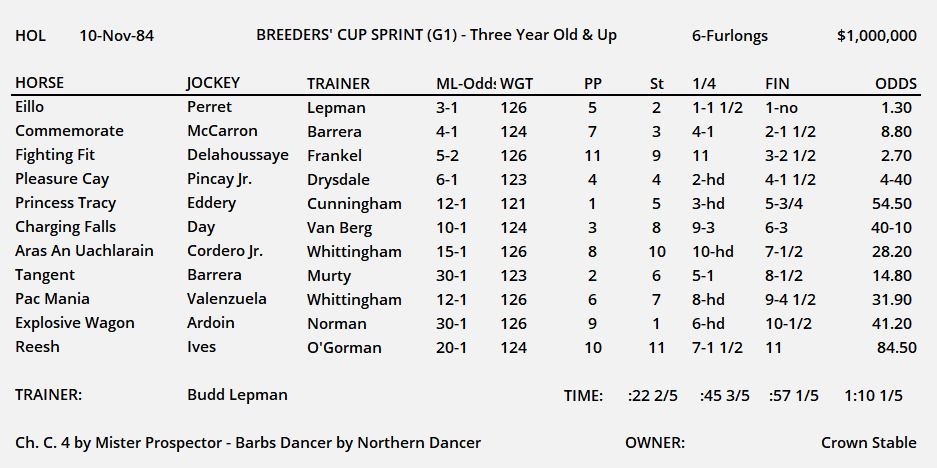
Win
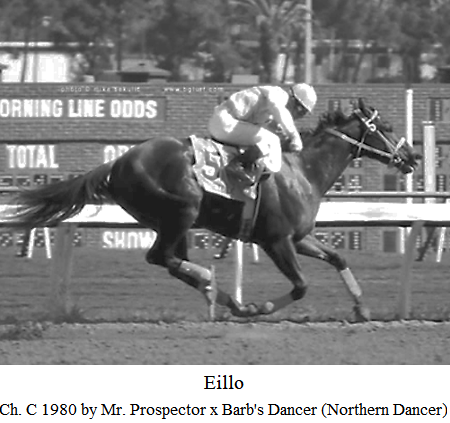
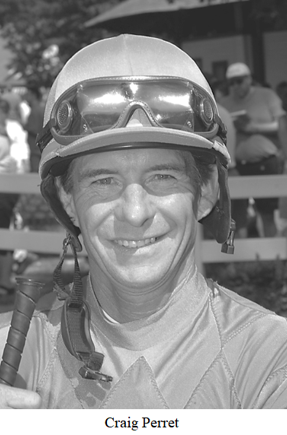
Place
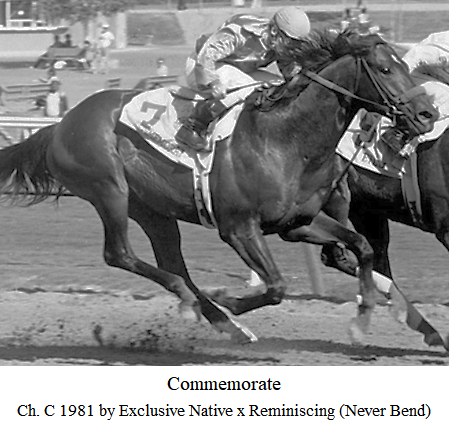
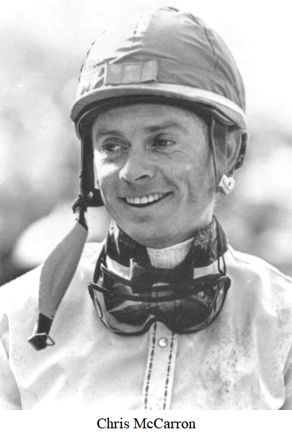
Show
